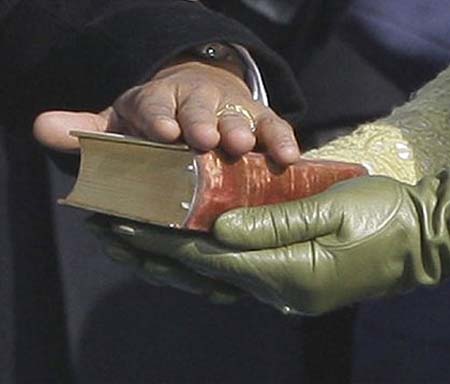Search results for the tag, "Religion"
November 29th, 2007

A version of this blog post appeared on Redstate on December 1, 2007.
Those running for president are asking us them to trust them with the launch codes to the world’s most powerful and largest stockpile of nuclear weapons. Surely, then, it’s perfectly appropriate to question their judgment.
The most controversial of these judgments concerns—ironically—the candidates’ most cherished beliefs, which is to say their religious convictions.
Let’s get the caveats out of the way: The candidates are running to be our president, not our priest, so whether they say grace or how often they attend church is inconsequential.
Yet since each one has professed to be a person of deeply felt faith, they have all thereby invited us to probe what that means.
Not because, as Christopher Hitchens would have it, religion is evil—from far it—but because anything—be it religion, a book or even a wife—which a candidates claims significantly informs his thinking, warrants scrutiny.
Addendum (12/7/2007): John Dickerson points out another paradox:
[Mitt Romney] claim[s] that for voters to ask questions about his faith runs afoul of the founders’ prohibition against religious tests for office. But the legal prohibition refers to government barring people from becoming a candidate or holding office. It does not bar voters from considering religion as they make their choices.
Also, the WSJ observes that evangelical bigotry toward Mormons is grossly misplaced:
Mormons seem the very embodiment of “family values,” and you couldn’t invent a religious culture that lived more consistently with Biblical messages. Broadly speaking, most Mormons have, and come from, big families; they’re regular churchgoers and give to charity; they don’t drink, smoke, gamble or engage in premarital sex. On the scale of American problems, the Mormons don’t even register.
August 23rd, 2005
In an editorial observer in today’s Times, Verlyn Klinkenborg asserts (rather than argues) that creationists are simply dumb. Of the 2004 poll showing that 45% of Americans believe that the Earth’s creation proceeded according to the description in the book of Genesis, he writes, “This isn’t a triumph of faith. It’s a failure of education.”
The implication is that with a little more schooling, creationists will turn the corner and embrace evolution.
Unfortunately, most will not, for Klinkenborg underestimates the power of faith.
Moreover, the real failure of education here is Klinkenborg’s attribution of ignorance to creationists. For instance, my conservative Christian friends not uninformed; they understand evolution, but reject it. Why? Simply put, because they’re ideologues, and, like all ideologues, no amount of textbooks, lectures or secular conversations will change their core values.
Footnote: For a brilliant analysis of “intelligent design,” read William Saletan’s essay, “Unintelligible Redesign.”
Addendum (9/4/2005): Another excellent article on I.D.: Daniel C. Dennett’s “Show Me the Science.”
April 1st, 2005

A version of this blog post appeared in the Utica Observer-Dispatch (April 3, 2005) and was noted on the Hamilton College Web site (April 3, 2005).
During junior high I traveled to away swim meets with the Listers. I never knew it until later, but they were devout Catholics, and what I remember most about my best friend’s family is something Margo Lister once told my mother, which my mom recounted to me. Seeing Pope John Paul II in the flesh in Newark, NJ, she said, was a divine experience. His skin appeared translucent, and she felt that he had reached into her soul.
I never understood this connection, but as time passed I began to appreciate the special influence the faithful reserved in their hearts for this pontiff. I recognized it in the politics of another friend in sport, Matt, with whom I went to Italy for a Latin class trip. I saw it in Jerry, a college friend who aspires, more than anyone I know, to live a life of uncompromised Catholic principles. And I learned to respect it—because the Pope earned these feelings not through divisions, which Stalin famously mocked the Vatican for lacking, but through moral leadership.
This is not to say that one need subscribe to the teachings of the Church, but that disagreement does not diminish John Paul’s weighty contributions to humanity—of all faiths.



Scholars “use an intellectual scalpel…